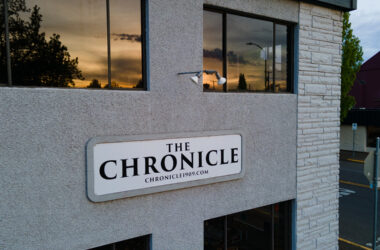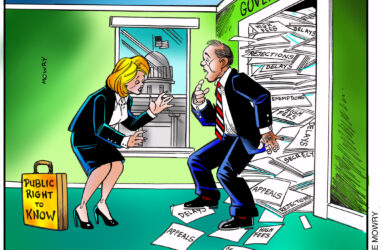Dear Editor:
Representatives often promise to help people meet basic needs – food, rent, and gasoline. Few question why gasoline is called a basic necessity. Gasoline, car insurance, car payments, fees, and repairs can take one-third of household income. In addition, a portion of income tax and property tax is funneled to road and highway use since user fees cover only about 50% of the costs.
Why does representative government primarily support one, unsustainable, deadly transportation system, the personal automobile?
Our local government has proposed a transportation utility fee (TUF) for road maintenance and construction which will further subsidize the inequitable transportation system. The decision was made because our roads are deteriorating. Many hours were devoted to finding a funding solution by the city council, administrator, and transportation committee but there seemed to be little or no input from the public or discussion about the TUF vs. a more equitable fuel tax or registration fee.
Reading council minutes, committee minutes, and the consultant report, there appears to be no discussion of how to reduce road degradation. Methods exist to reduce road wear and thereby expenses with speed-calming structures, alternative non-motorized routes, protected bike lanes, elimination of stop signs, thru-street closures, collective transport shuttles, traffic cameras, and funding for LTD.
In the past 30 years, average personal vehicle weight has increased 22% and people who can drive are driving more. Over the past 40 years the mileage driven has more than doubled. Oregonians average over 12,000 miles per year. The increased weight and increased use is degrading the roads but users are not paying as they drive.
The proposed ordinance allows hardship exemptions but the poor already are burdened by applications and registration for Medicaid, SNAP, SSI, property tax exemptions, USDA lunch programs, Food for Lane County, utility assistance, and perhaps more. How much of the TUF funds will be lost administering exemptions?
Over the past 40 years, the quality of life has degraded from noise, dust, and congestion due to increased motor vehicle use in our small town with little attention to the effect on “creating a safe, livable, attractive community with a unique small town atmosphere.”
The city has not investigated why residents of single-family detached dwellings contribute over nine ADTs (Average Daily Traffic trips) which endanger others, degrades quality of life, and are costly when alternative transport may exist.
The roads need repair but we need to adopt an equitable funding system and ways to preserve our roadways. The TUF is not equitable, fair, or sustainable.
Ed Gunderson, Creswell






